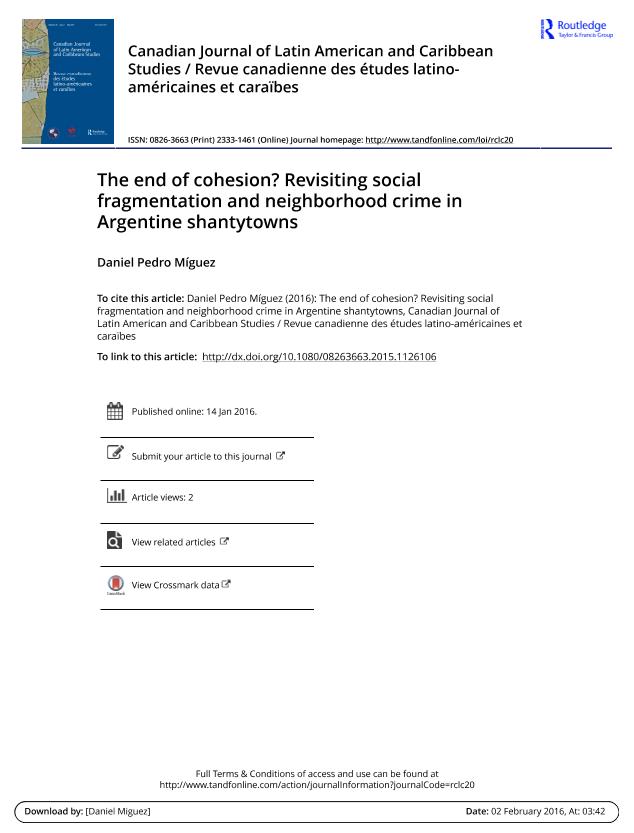Mostrar el registro sencillo del ítem
dc.contributor.author
Miguez, Daniel Pedro

dc.date.available
2017-08-14T23:24:16Z
dc.date.issued
2016-01
dc.identifier.citation
Miguez, Daniel Pedro; The end of cohesion? Revisiting social fragmentation and neighbourhood crime in Argentine shantytowns; Taylor & Francis; Canadian Journal of Latin American and Caribbean Studies / Revue canadienne des études latino-américaines et caraïbes; 41; 1; 1-2016; 61-75
dc.identifier.issn
0826-3663
dc.identifier.uri
http://hdl.handle.net/11336/22393
dc.description.abstract
Rising crime rates have been a growing concern in Argentina since the 1990s. A significant body of research has associated this crime rise with the fragmentation of social bonds and forms of internal cohesion in urban areas affected by a high concentration of unemployment and poverty by income resulting from neoliberal structural reforms. Based on data from a survey conducted between 2004 and 2006, this paper’s aim is to provide some new insights to this issue by measuring the presence and extension of networks based on mutual trust and reciprocity and estimating the incidence of conflict and crime in Argentine shantytowns. These estimations suggest that the social fragmentation thesis requires certain qualifications and enable some additional hypotheses about how neoliberal policies affected the internal forms of coexistence among shantytown dwellers.
dc.description.abstract
La croissance de la criminalité a été une préoccupation en Argentine au cours des dernières décennies. Un nombre important d’études ont associé cette croissance à la fragmentation des liens sociaux dans les zones urbaines caractérisées par la concentration du chômage et la pauvreté résultat des réformes structurelles préconisées par le néolibéralisme. D’après les résultats d'une enquête menée entre 2004 et 2006, ce document vise à apporter des éléments nouveaux à la théorie de la fragmentation sociale basée sur des mesures de la présence et de l’étendue des réseaux internes de la réciprocité et l’incidence des conflits et la criminalité dans les bidonvilles. Ces estimations suggèrent la nécessité d’incorporer quelques nuances à la thèse de la fragmentation sociale a eu lieu jusqu’ici, et suggère également de nouvelles hypothèses sur les effets des politiques néolibérales dans les formes de relation sociale entre les gens des bidonvilles.
dc.format
application/pdf
dc.language.iso
eng
dc.publisher
Taylor & Francis

dc.rights
info:eu-repo/semantics/openAccess
dc.rights.uri
https://creativecommons.org/licenses/by-nc-sa/2.5/ar/
dc.subject
Social Fragmentation
dc.subject
Crime
dc.subject
Argentina
dc.subject
Shantytowns
dc.title
The end of cohesion? Revisiting social fragmentation and neighbourhood crime in Argentine shantytowns
dc.type
info:eu-repo/semantics/article
dc.type
info:ar-repo/semantics/artículo
dc.type
info:eu-repo/semantics/publishedVersion
dc.date.updated
2017-06-08T19:50:46Z
dc.identifier.eissn
2333-1461
dc.journal.volume
41
dc.journal.number
1
dc.journal.pagination
61-75
dc.journal.pais
Canadá

dc.journal.ciudad
Toronto
dc.description.fil
Fil: Miguez, Daniel Pedro. Consejo Nacional de Investigaciones Científicas y Técnicas. Centro Científico Tecnológico Conicet - Tandil. Instituto de Geografía, Historia y Ciencias Sociales. Universidad Nacional del Centro de la Provincia de Buenos Aires. Instituto de Geografía, Historia y Ciencias Sociales; Argentina
dc.journal.title
Canadian Journal of Latin American and Caribbean Studies / Revue canadienne des études latino-américaines et caraïbes
dc.relation.alternativeid
info:eu-repo/semantics/altIdentifier/url/http://www.tandfonline.com/doi/full/10.1080/08263663.2015.1126106
dc.relation.alternativeid
info:eu-repo/semantics/altIdentifier/doi/http://dx.doi.org/10.1080/08263663.2015.1126106
Archivos asociados
